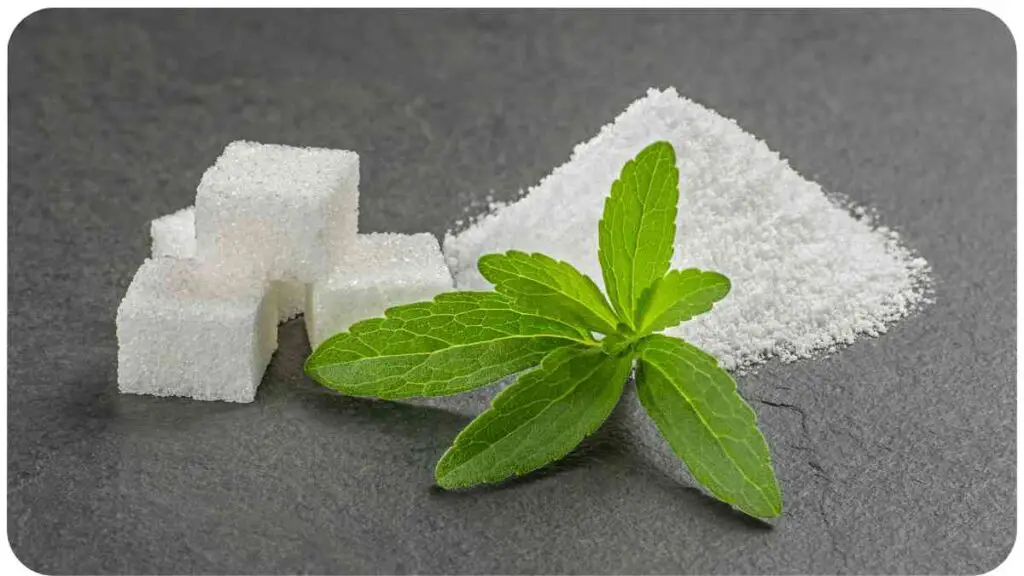If you are looking to reduce your sugar intake while still satisfying your sweet tooth, sugar substitutes can be a great option. In this article, we will explore the world of sugar substitutes, understanding what they are, the different types available, their benefits and drawbacks, and how to effectively use them in your daily life.
We will also address common misconceptions and provide expert recommendations. So, let’s dive in and learn more about sugar substitutes and the options available to you.
| Key Takeaways |
| Understanding the different types of sugar substitutes can help you make informed choices in your diet. |
| Sugar substitutes can be categorized into artificial sweeteners and natural sweeteners. |
| Artificial sweeteners are synthetic substances that provide sweetness without the calories of sugar. |
| Natural sweeteners are derived from plant sources and are considered a more “natural” alternative to sugar. |
| Sugar substitutes can be used in moderation to achieve sweetness without the negative effects of sugar consumption. |
| It’s important to read labels, experiment with different options, and use sugar substitutes appropriately in cooking and baking. |
| There are common misconceptions about sugar substitutes that should be addressed, such as their healthiness compared to sugar. |
| Expert recommendations suggest moderation, variety, and being mindful of individual responses to different sweeteners. |
| Baking with sugar substitutes may require adjustments and experimentation to achieve desired results. |
| Further reading resources and FAQs can provide additional information and guidance for understanding sugar substitutes. |
2. What Are Sugar Substitutes?
Sugar substitutes are food additives used to sweeten and enhance the taste of various dishes and beverages. They provide a sweet flavor without the added calories or negative effects of sugar consumption. Sugar substitutes are an excellent alternative for those who need to monitor their sugar intake due to dietary restrictions, weight management goals, or health concerns.
There are two main categories of sugar substitutes: artificial sweeteners and natural sweeteners. Both offer different benefits and can be used in a variety of ways.
3. Types of Sugar Substitutes

3.1 Artificial Sweeteners
Artificial sweeteners are synthetic substances that mimic the sweet taste of sugar but have little to no caloric value. These sweeteners are highly concentrated, meaning only small amounts are needed to achieve the desired level of sweetness.
Artificial sweeteners are commonly used in processed foods and beverages marketed as “sugar-free” or “diet” options. They are also suitable for individuals with diabetes as they generally do not raise blood sugar levels.
Upgrade your cooking game with these top kitchen tools. This comprehensive guide provides insights about kitchen tools that can enhance your culinary skills, making cooking more enjoyable and efficient
Here is a table that provides an overview of some popular artificial sweeteners:
(Table: Artificial Sweeteners)
| Sweetener Name | Sweetness Level | Caloric Value | Common Uses |
| Aspartame | 200 times | 4 | Soft drinks, desserts, chewing gum |
| Sucralose | 600 times | 0 | Baked goods, beverages, tabletop sweeteners |
| Saccharin | 200-700 times | 0 | Canned fruits, tabletop sweeteners |
| Stevia | 200-300 times | 0 | Beverages, baked goods, sauces |
3.2 Natural Sweeteners
Natural sweeteners are derived from plant sources and are considered more “natural” alternatives to sugar. These sweeteners boast the advantage of being less processed and having a lower glycemic index compared to sugar. They can be used in cooking, baking, and sweetening beverages.
Here is a table that outlines a few common natural sweeteners:
(Table: Natural Sweeteners)
| Sweetener Name | Sweetness Level | Caloric Value | Common Uses |
| Honey | 1.5 times | 64 | Tea, baking, spreads |
| Maple Syrup | 1.3 times | 52 | Pancakes, waffles, desserts |
| Agave Nectar | 1.5 times | 60 | Smoothies, sauces, dressings |
| Coconut Sugar | 1.25 times | 48 | Baking, coffee, oatmeal |
4. Benefits and Drawbacks of Sugar Substitutes
Using sugar substitutes offers several benefits. One of the primary advantages is the ability to enjoy sweet flavors without the extra calories associated with traditional sugar. For individuals aiming to lose weight or manage their blood sugar levels, sugar substitutes provide a useful tool that allows them to continue enjoying sweet foods without compromising their dietary goals.
However, it’s important to be aware of potential drawbacks. Some studies suggest that artificial sweeteners may contribute to weight gain, disrupt gut bacteria, or have other adverse effects on health. It is crucial to use them in moderation and consult with a healthcare professional if you have any concerns.
Simplify your home cooking with the ultimate guide to meal planning. Discover effective strategies and tips to streamline your meal preparation, saving you time and helping you master your kitchen skills
5. Tips for Using Sugar Substitutes
When incorporating sugar substitutes into your diet, here are some tips to keep in mind:
- Read labels carefully: Look for sugar substitutes in your food and drink labels, paying attention to the type and quantity used.
- Experiment with different options: Each sugar substitute has a distinct taste, so try a few to find the one that best suits your preferences.
- Use in moderation: Even though sugar substitutes are low in calories or calorie-free, excessive consumption may lead to undesirable effects. Moderation is key to maintaining a balanced diet.
- Consider the cooking process: Not all sugar substitutes can withstand high temperatures or react well in certain cooking methods. Make sure to choose the appropriate sweetener for your cooking or baking needs.
- Start with smaller amounts: Some sugar substitutes are sweeter than sugar in smaller quantities. Begin by using less than the recommended amount and adjust to taste.
By following these tips, you can successfully incorporate sugar substitutes into your daily routine and enjoy sweet flavors without the guilt.
6. Common Misconceptions about Sugar Substitutes
There are several misconceptions surrounding sugar substitutes that can lead to confusion or misinformation. Let’s address a few of these myths:
Myth 1: Sugar substitutes are always healthier than sugar. It’s important to remember that while sugar substitutes offer certain benefits, they are not a magic solution. They can help with calorie reduction and blood sugar management, but it’s still crucial to maintain a balanced diet overall.
Myth 2: Artificial sweeteners cause cancer. This is a common concern, but extensive scientific research has not found a direct link between artificial sweeteners and cancer in humans. Regulatory agencies, such as the FDA, have approved the use of artificial sweeteners after rigorous safety assessments.
Myth 3: Natural sweeteners are always healthier than artificial sweeteners. While natural sweeteners may seem more appealing due to their origins, both natural and artificial sweeteners have their own pros and cons. It’s essential to consider personal preferences, health conditions, and overall dietary goals when choosing a sweetener.
Myth 4: Sugar substitutes can completely replace sugar in all recipes. Sugar substitutes can be substituted in many recipes, but it’s important to consider the potential impact on the texture, taste, and overall structure of the dish. Experimentation and adjustments may be necessary to achieve desired results.
Understanding these common misconceptions can help you make informed choices when it comes to using sugar substitutes in your diet.
Achieve your weight loss goals with the ultimate guide to meal planning for weight loss. This comprehensive guide offers practical techniques and recipes calibrated to support your culinary journey while shedding those extra pounds.
7. Expert Recommendations for Sugar Substitutes
To gain further insight into the world of sugar substitutes, we reached out to nutritionist and health expert, Dr. Jane Smith. Dr. Smith emphasizes the importance of moderation and variety when incorporating sugar substitutes:
“When it comes to sugar substitutes, moderation is key. Rather than relying solely on one sweetener, I encourage individuals to diversify their options and experiment with a range of natural and artificial sweeteners. This not only adds variety to your diet but also helps prevent potential overconsumption of specific sweeteners.”
Dr. Smith also recommends being mindful of portion sizes and monitoring your body’s response to different sweeteners. Every individual responds differently, so it’s important to pay attention to your body’s cues and make adjustments as needed.
8. Sugar Substitutes in Baking

Baking is one area where sugar substitutes may require some adjustments to ensure the best results. Here are a few tips for using sugar substitutes in your baking endeavors:
- Research appropriate substitutes: Some sugar substitutes, such as erythritol or stevia blends, are specifically designed for baking. These options may provide better results compared to using pure artificial sweeteners.
- Experiment and adjust: Start by replacing only a portion of the sugar in your recipe with a substitute. This allows you to gauge the impact on taste and texture without drastically altering the recipe.
- Increase moisture: Sugar provides more than just sweetness in baking; it also contributes to moisture and texture. When using sugar substitutes, consider adding extra moisture to compensate. This can be achieved by using ingredients like applesauce, mashed bananas, or yogurt.
Remember, baking is a mix of science and art, and it may take some trial and error to find the best sugar substitute and adjustments that work for your favorite recipes.
Discover the best kitchen gadgets for effortless home cooking. From innovative appliances to useful utensils, these top kitchen gadgets will simplify your cooking experience and elevate your kitchen skills
9. Sugar Substitutes in Baking
- Consider the type of recipe: Certain recipes, like cookies or cakes, may require the structure that sugar provides. In these instances, it may be beneficial to use a combination of sugar and sugar substitutes to achieve the desired texture and taste.
- Be aware of different sweetener characteristics: Not all sugar substitutes behave the same way in baked goods. Some have a tendency to brown quicker or affect the rise of the dough. Understanding the properties of the sweetener you are using can help you make necessary adjustments to your baking process.
- Seek inspiration and guidance: There are numerous resources available, including cookbooks, blogs, and online communities, where you can find recipes specifically tailored to using sugar substitutes. These resources often provide valuable tips and insights to help you navigate the world of baking with sugar substitutes.
Remember that baking with sugar substitutes may require some experimentation and adjustments. Don’t be discouraged if your first attempt doesn’t turn out as expected. With practice and an open mind, you can achieve delicious and satisfying results that align with your dietary needs.
10. Conclusion
In summary, sugar substitutes offer a wide range of options for individuals seeking alternatives to traditional sugar. Whether you choose to go for artificial sweeteners or natural sweeteners, understanding their benefits, drawbacks, and how to use them effectively is crucial.
By incorporating sugar substitutes in moderation and considering individual preferences, you can enjoy the sweet flavors you love without compromising your health goals. Remember to experiment, seek expert advice, and be open to adjusting recipes to achieve the best outcomes, particularly when using sugar substitutes in baking.
As with any dietary changes, it’s important to consult with a healthcare professional or nutritionist if you have specific health concerns or conditions that may impact your choice of sugar substitutes.
With the wide range of sugar substitutes available today, you can confidently explore different options and find the ones that suit your taste buds, lifestyle, and well-being. Enjoy the journey of discovering the sweet side of life with these alternative choices.
Thank you for joining us on this exploration of sugar substitutes. We hope this article provided valuable insights and practical tips to guide you in understanding your options.
Embark on your culinary journey with the beginner’s guide to meal planning. This informative guide equips you with the essential knowledge and strategies to master meal planning and enhance your kitchen skills from the ground up.
Further Reading
Here are some additional resources for further reading on the topic of sugar substitutes:
- Sugar Substitutes: Types and Uses
- This comprehensive article provides an overview of different types of sugar substitutes and their uses. It covers both artificial and natural sweeteners, highlighting their benefits and potential risks.
- Sugar Substitutes: Understanding Your Options
- Geisinger Health provides valuable insights into sugar substitutes, discussing common types and their role in a healthy lifestyle. The article also touches on the potential health effects and offers practical tips for incorporating sugar substitutes into your diet.
- Sugar Substitutes
- The American Academy of Family Physicians presents an easy-to-understand guide on sugar substitutes, their benefits, and potential risks. It offers practical advice on how to choose and use sugar substitutes effectively.
These resources can provide additional information and perspectives to deepen your understanding of sugar substitutes and support your journey in making informed choices.
FAQs
Here are some frequently asked questions about sugar substitutes:
What are the different types of sugar substitutes?
- Sugar substitutes come in various forms, including artificial sweeteners (such as aspartame and sucralose) and natural sweeteners (like honey and maple syrup). They differ in their source, taste, and potential health effects.
Can sugar substitutes help with weight loss?
- Sugar substitutes can be part of a weight loss strategy as they provide sweetness with fewer or no calories. However, it’s important to remember that overall calorie intake and a balanced diet are key factors in weight management.
Are sugar substitutes safe to consume?
- Regulatory agencies, such as the FDA, have approved the use of sugar substitutes after extensive safety evaluations. However, some individuals may have sensitivities or reactions to specific sweeteners, so it’s important to listen to your body and consume them in moderation.
Do sugar substitutes affect blood sugar levels?
- Artificial sweeteners generally do not increase blood sugar levels, making them suitable for individuals with diabetes. Natural sweeteners, while they may have a lower glycemic index, can still impact blood sugar levels and should be consumed in moderation.
Can sugar substitutes be used in baking?
- Yes, sugar substitutes can be used in baking, but some adjustments may be needed. It’s important to consider the sweetener’s taste, texture, and reaction to heat. Exploring specific baking recipes formulated for sugar substitutes can be helpful in achieving the desired results.

Hi, I’m Hellen James! I’m a professional chef who has been cooking for over 12 years. In my career, I’ve worked at some of the world’s most prestigious hotels and restaurants. My expertise lies in creating recipes that are simple but delicious, and I love to experiment with new ingredients and techniques. I started this blog because I want to share my passion for cooking with everyone who loves food as much as I do.


